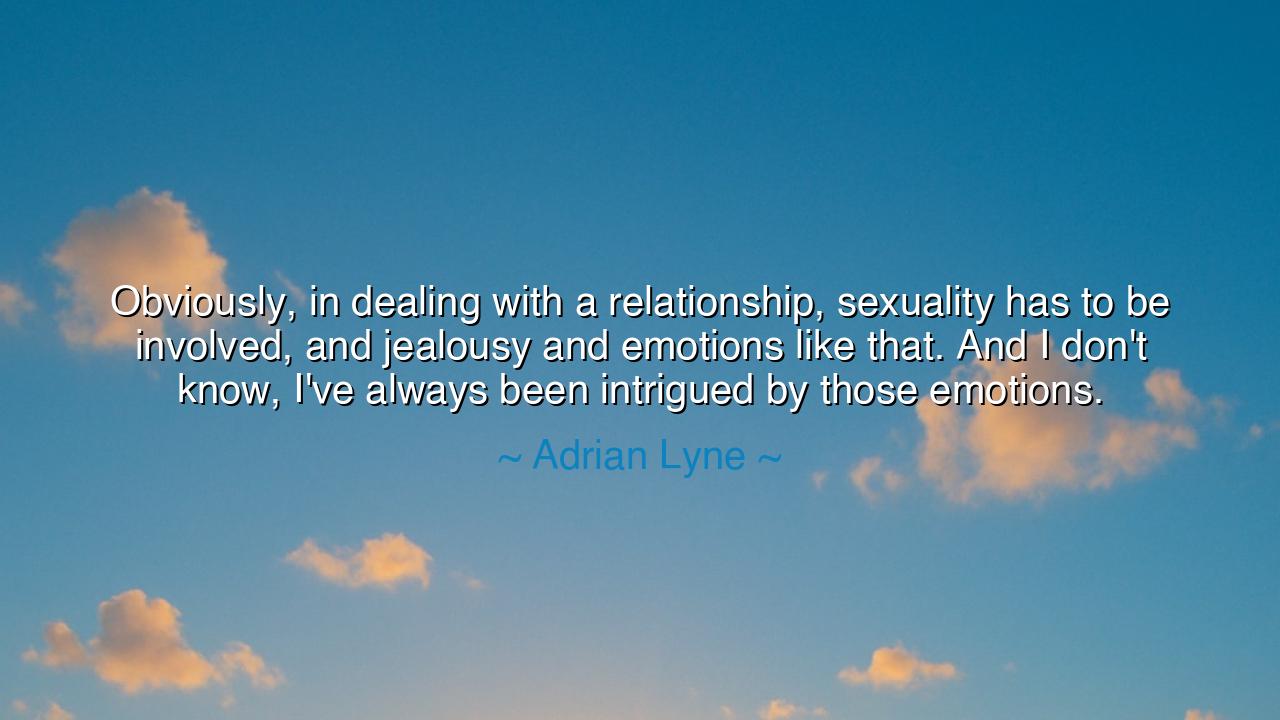
Obviously, in dealing with a relationship, sexuality has to be
Obviously, in dealing with a relationship, sexuality has to be involved, and jealousy and emotions like that. And I don't know, I've always been intrigued by those emotions.






In the reflective and daring words of Adrian Lyne, the filmmaker who explored the stormy seas of human passion, there breathes a truth both ancient and eternal: “Obviously, in dealing with a relationship, sexuality has to be involved, and jealousy and emotions like that. And I don’t know, I’ve always been intrigued by those emotions.” These words come not from the lips of a philosopher, but from an artist who dared to look unflinchingly into the heart’s shadows — where love and desire intertwine, where jealousy, lust, and emotion rule as both creators and destroyers of human connection. Lyne’s insight reminds us that to understand the human condition, one must not turn away from passion, but confront it — for within passion lie both the ecstasy and the peril of the soul.
The origin of this quote lies in the life and work of Adrian Lyne, whose films — from Fatal Attraction to Unfaithful — delve into the labyrinth of love, temptation, and betrayal. Through his art, Lyne sought not to glorify passion but to reveal its complexity — the way it burns, heals, and wounds. He understood that relationships are not built solely upon reason or virtue, but upon the trembling currents of emotion that surge beneath them. In his quote, he admits to his intrigue — that human relationships are not made noble by their purity, but by their struggle. He acknowledges that love without emotion is hollow, and emotion without restraint is ruinous.
Lyne’s words echo the wisdom of the ancients, who saw love not as a gentle flame but as a divine fire that can both illuminate and consume. The Greeks spoke of Eros, the god of passionate desire, who could make gods tremble and mortals lose their reason. To them, jealousy and sexual longing were not sins to be condemned, but forces to be understood — the natural turbulence of souls that seek to possess what they cannot fully hold. Plato, in his dialogues, described love as the yearning of one soul to reunite with its lost other half. Yet even he knew that this yearning brings both joy and suffering, for passion is a power that humbles the mighty and exalts the humble. Thus, what Lyne calls “intriguing” is what philosophers once called divine madness — the irrational, irresistible pull that binds two beings together in both pleasure and peril.
Consider the story of Cleopatra and Mark Antony, whose union burned brighter than the empires they commanded. Their passion defied reason, their jealousy defied diplomacy. They loved not with prudence but with abandon, and in their love, they lost kingdoms and lives. Yet history remembers them not as fools, but as legends — for their love, though destructive, revealed the fullness of the human heart. Like Lyne’s fascination, their story reminds us that these emotions — desire, jealousy, fear, and longing — are not merely weaknesses, but the very elements that make love real. To love safely is to love half-heartedly; to love fully is to risk the storm.
Lyne’s fascination with these emotions speaks also to the artist’s calling — to explore what others fear to touch. Sexuality and jealousy, though often seen as dark or forbidden, are truths of our shared humanity. They reveal the fragile balance between body and soul, possession and freedom, tenderness and power. The wise do not deny these forces but learn to understand them, for the one who pretends to be beyond passion becomes cold and hollow, while the one who surrenders completely becomes enslaved. True wisdom lies in awareness — in recognizing the storm without being drowned by it.
In every age, there have been those who sought to purify love of passion, to make it safe and orderly. But love cannot be tamed. It moves through the human heart like a wild wind — unpredictable, sometimes cruel, yet always honest. To deny its darker shades — jealousy, desire, fear of loss — is to deny the very truth of our nature. Lyne, in his own way, reminds us that love is not only found in the gentle embrace but also in the trembling hand, the racing pulse, the moment when one’s heart becomes both sanctuary and battlefield. To be human is to feel — fully, dangerously, beautifully.
The lesson, then, is one of balance and bravery. Do not fear the emotions that love awakens in you — the longing, the envy, the vulnerability. Instead, strive to understand them. Let passion be your teacher, not your master. Let jealousy remind you of what you cherish, but do not let it rule your heart. In every relationship, seek not to erase emotion, but to transform it into understanding, tenderness, and trust. For only when we walk through the shadows of our emotions can we emerge into the light of true connection.
So, my listener, take to heart the wisdom behind Adrian Lyne’s words. To love is to walk a path lined with both roses and thorns. To feel deeply is to risk deeply. Yet it is only through these emotions — sexuality, jealousy, longing, and love — that we touch the sacred depth of what it means to be alive. Do not flee from passion, but learn to guide it; do not fear emotion, but let it refine you. For the soul that has never been moved by love’s fire may remain unscarred — but it also remains unlit.






AAdministratorAdministrator
Welcome, honored guests. Please leave a comment, we will respond soon